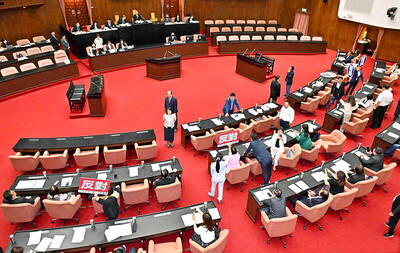Two Russian firms and a Swiss commodity trader announced a merger on Monday that would form the world's largest aluminum maker, overtaking Alcoa of the US and creating a Russian giant to take its place.
Under the deal, Rusal, now Russia's largest aluminum firm, would merge with its smaller local rival, Sual, and mining assets belonging to the Swiss company, Glencore, to create a company with an estimated value of US$25 billion to US$30 billion, controlled by the Russian oligarch who is the owner of Rusal, Oleg Deripaska, the country's sixth-richest man.
The deal continues a pattern in Russia of uniting companies separated in the breakup of the Soviet Union and the subsequent privatization in the 1990s into large, new monopolies, a crucial part of the economic policy of Russian President Vladimir Putin.
Analysts say the mergers have been driven by national pride and partly by efficiencies that can be created by large companies.
"It's a very important deal for the image of Russia. It creates a global leader, No.1. This is good for Russia," Aleksandr Bulygin, the chief executive of Rusal who will have the same post in the merged company, said in a telephone interview.
Like Gazprom or the government-owned oil company Rosneft, the new merged aluminum company intends to list shares on Western stock exchanges, leveraging its size and high commodity prices to get access to international capital.
Sual is majority-owned by the Viktor Vekselberg, Russia's fourth-richest man. Glencore was founded by Marc Rich, the US commodities trader who fled the US to avoid facing charges of tax evasion, racketeering and fraud and was pardoned by then president Bill Clinton in January 2001. Glencore is now owned by its employees.
The new company intends to place shares on the London Stock Exchange in 18 months, executives said on Monday. Rusal would own 66 percent, Sual 22 percent and Glencore 12 percent. The annual revenue would be US$10 billion, Bulygin said.
The combined company, also to be known as Rusal, will produce about 4 million tonnes a year of the lightweight metal used in cans, foil and automotive parts, compared with the 3.5 million tonnes made by Alcoa last year.
The deal, which company executives said should be closed by April 1 next year, would need regulatory clearance in Russia, the EU and possibly the US, along with Jamaica, Ireland and other countries where bauxite mines are located, Bulygin said.
Alcoa, based in Pittsburgh, is a century-old company and a storied name in US business. Alcoa's competitive edge has been dulled because electricity, a major factor in the production of aluminum, is a high-priced commodity.
Rusal has a distinct advantage: Its plants are supplied with some of the world's cheapest electricity, produced by hydropower dams on Siberian rivers. That power is cheap because it is "shut in," or too far from any large city to economically be sold to residential consumers at higher prices.

INSPIRING: Taiwan has been a model in the Asia-Pacific region with its democratic transition, free and fair elections and open society, the vice president-elect said Taiwan can play a leadership role in the Asia-Pacific region, vice president-elect Hsiao Bi-khim (蕭美琴) told a forum in Taipei yesterday, highlighting the nation’s resilience in the face of geopolitical challenges. “Not only can Taiwan help, but Taiwan can lead ... not only can Taiwan play a leadership role, but Taiwan’s leadership is important to the world,” Hsiao told the annual forum hosted by the Center for Asia-Pacific Resilience and Innovation think tank. Hsiao thanked Taiwan’s international friends for their long-term support, citing the example of US President Joe Biden last month signing into law a bill to provide aid to Taiwan,

China’s intrusive and territorial claims in the Indo-Pacific region are “illegal, coercive, aggressive and deceptive,” new US Indo-Pacific Commander Admiral Samuel Paparo said on Friday, adding that he would continue working with allies and partners to keep the area free and open. Paparo made the remarks at a change-of-command ceremony at Joint Base Pearl Harbor-Hickam in Hawaii, where he took over the command from Admiral John Aquilino. “Our world faces a complex problem set in the troubling actions of the People’s Republic of China [PRC] and its rapid buildup of forces. We must be ready to answer the PRC’s increasingly intrusive and

STATE OF THE NATION: The legislature should invite the president to deliver an address every year, the TPP said, adding that Lai should also have to answer legislators’ questions The Chinese Nationalist Party (KMT) yesterday proposed inviting president-elect William Lai (賴清德) to make a historic first state of the nation address at the legislature following his inauguration on May 20. Lai is expected to face many domestic and international challenges, and should clarify his intended policies with the public’s representatives, KMT caucus secretary-general Hung Meng-kai (洪孟楷) said when making the proposal at a meeting of the legislature’s Procedure Committee. The committee voted to add the item to the agenda for Friday, along with another similar proposal put forward by the Taiwan People’s Party (TPP). The invitation is in line with Article 15-2

Premier Chen Chien-jen (陳建仁) and the Ministry of Foreign Affairs yesterday denounced Chinese Nationalist Party (KMT) Legislator Hsu Chiao-hsin (徐巧芯) for making false allegations about donations to Ukraine and disclosing confidential documents, with the ministry saying that it would take legal action. The ministry last year signed an agreement with the Czech Republic on a healthcare project to assist Ukraine, which is to be carried out by the Czech Health Technology Institute. Hsu accused the ministry of being indirectly involved in the party politics of the Czech Republic as institute chairman Petr Foit is a local medical supplier, and has close political